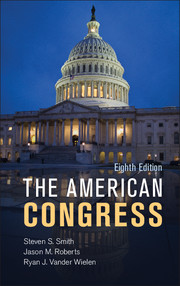Book contents
- Frontmatter
- Contents
- PREFACE
- Acknowledgments
- 1 The Troubled Congress
- 2 Representation and Lawmaking in Congress
- 3 Congressional Elections and Policy Alignments
- 4 Members, Goals, Resources, and Strategies
- 5 Parties and Leaders
- 6 The Standing Committees
- 7 The Rules of the Legislative Game
- 8 The Floor and Voting
- 9 Congress and the President
- 10 Congress and the Courts
- 11 Congress, Lobbyists, and Interest Groups
- 12 Congress and Budget Politics
- Appendix Introduction to the Spatial Theory of Legislating
- Index
- References
7 - The Rules of the Legislative Game
- Frontmatter
- Contents
- PREFACE
- Acknowledgments
- 1 The Troubled Congress
- 2 Representation and Lawmaking in Congress
- 3 Congressional Elections and Policy Alignments
- 4 Members, Goals, Resources, and Strategies
- 5 Parties and Leaders
- 6 The Standing Committees
- 7 The Rules of the Legislative Game
- 8 The Floor and Voting
- 9 Congress and the President
- 10 Congress and the Courts
- 11 Congress, Lobbyists, and Interest Groups
- 12 Congress and Budget Politics
- Appendix Introduction to the Spatial Theory of Legislating
- Index
- References
Summary
Congressional politics often has the flavor of a game – albeit a very important game – as the contending factions vie for control over public policy. The game is characterized by bargaining, procedural maneuvers, close votes, and uncertainty. When the interests and rights of large groups in society are at stake, the game is emotionally charged. The game is made more compelling by the personalities of the players. Members of Congress, presidents, staff aides, lobbyists, and other participants in congressional politics are ambitious people. Many of them hate to lose. Skilled players are masters of the rules; they are proficient in strategy and tactics and take pleasure in anticipating the moves of their opponents. Their knowledge of the rules and their aptitude for strategy do not guarantee success, but can give them an advantage. Even for spectators, mastering the rules and strategy is essential to appreciating and enjoying the game.
The rules of the game change – and legislators do the changing. Each chamber of Congress is empowered by the Constitution to enact its own rules. The rules of the House of Representatives extend to more than 60,000 words, but the Senate’s rules are less than half that long at around 30,000 words. The differences in the length of the rules reflect not only the differences in the sizes of the two chambers, with the larger House requiring more formalities to keep order, but also the different paths that the two chambers took at critical junctures in their parliamentary histories. The Senate, at a very early point in its history, eliminated the means to limit debate, which created the possibility of preventing a vote on a measure by refusing to stop talking. As a result, controversial changes in the rules can be blocked by a minority in the Senate. The House, in contrast, adopted a means to limit debate by a simple majority vote, which allowed even small majorities to impose new rules on that chamber. The result is that the House gradually accumulated a much larger and more detailed set of rules.
- Type
- Chapter
- Information
- The American Congress , pp. 217 - 248Publisher: Cambridge University PressPrint publication year: 2013



